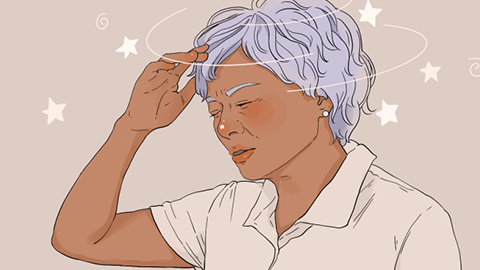What causes dizziness and buttock pain?
Generally, the simultaneous occurrence of dizziness and buttock pain may be caused by prolonged sitting with poor posture, overexertion, lumbar disc herniation, sciatica, or low blood pressure accompanied by piriformis syndrome. If discomfort symptoms occur, it is recommended to seek timely medical evaluation and treatment at a正规 hospital. Specific analyses are as follows:
1. Prolonged Sitting with Poor Posture
Sitting for extended periods with slouched or improper posture can compress the gluteal muscles, leading to ischemia and pain. This also impairs lower limb circulation and causes mild cerebral hypoperfusion, resulting in dizziness. Immediately stand up and move around, adjust your sitting posture to keep the back straight, take a 5-minute walk every 30 minutes of sitting, and gently massage the buttocks to improve blood flow and relieve discomfort.

2. Overexertion
Prolonged standing, walking, or physical labor can lead to muscle strain in the buttocks and cause pain. Excessive energy consumption and mild drops in blood glucose levels may trigger dizziness. Stop strenuous activity and rest by sitting or lying down, drink warm water containing sugar, consume easily digestible food, massage the buttock muscles to relax them, and avoid high-intensity physical activities in the short term.
3. Lumbar Disc Herniation
A herniated lumbar intervertebral disc can compress nerve roots, causing radiating pain in the buttocks. The protruding tissue may also affect spinal cord blood supply, leading to dizziness, often accompanied by numbness in the lower back and legs. Under medical guidance, medications such as ibuprofen sustained-release capsules, mecobalamin tablets, and Yaotongning capsules may be taken. Lumbar traction therapy may also be used. In severe cases, percutaneous endoscopic discectomy may be required. After surgery, avoid prolonged sitting or standing.
4. Sciatica
Compression or inflammatory irritation of the sciatic nerve causes pain in the buttocks and lower limbs. Severe pain may trigger a stress response in the body, resulting in dizziness, which worsens with movement. Under medical guidance, medications such as diclofenac sodium sustained-release tablets, vitamin B12 tablets, and celecoxib capsules may be used. Avoid vigorous exercise; acupuncture or physical therapy may be necessary to relieve symptoms.
5. Low Blood Pressure Accompanied by Piriformis Syndrome
Low blood pressure leads to insufficient cerebral perfusion and dizziness, while piriformis muscle tension or spasm compresses the sciatic nerve, causing buttock pain. Dizziness may worsen when standing up. Under medical supervision, oral medications such as Shengmai Yin (Shengmai Drink), Yiqi Yangxue Oral Liquid, and muscle relaxants like eperisone hydrochloride tablets may be prescribed. Rise slowly from sitting or lying positions to prevent orthostatic hypotension, and perform regular piriformis muscle stretching exercises.
In daily life, maintain proper sitting posture and avoid prolonged sitting; follow a regular作息 schedule to prevent overexertion; engage in moderate exercise to strengthen the back and gluteal muscles; monitor blood pressure regularly; and seek medical attention promptly if dizziness or buttock pain persists or fails to improve.










